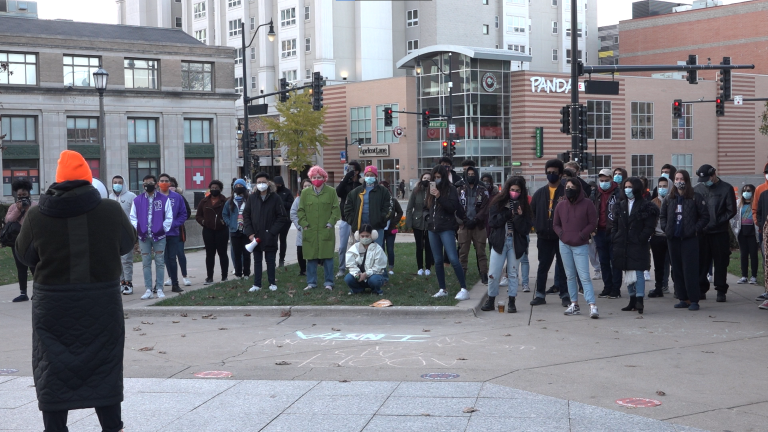Editor’s Note: This story has been updated to include information about the number of counselors and funds for mental health services provided by the University of Illinois.
URBANA – Students at the University of Illinois at Urbana-Champaign held a vigil Nov. 1 to honor the life of a student who died by suicide in late October. The vigil was also meant to bring awareness to what the students argue is a lack of adequate mental health services at the university.
“We need more resources,” student advocate Sarena Abdallah said. “The resources that we currently have here at UIUC are insufficient.”
Abdallah was one of the leaders of the vigil. She was inspired to create the vigil due to the lack of communication from the university regarding the suicide.
The suicide she refers to occurred in late October in Hopkins Hall. News of the suicide spread online, especially after a message reading “This really is it for me. I lost,” was found spray-painted on the side of the Main Library.
Social media posts suggest many assumed the message was left by the student; but Illinois Newsroom has not confirmed this. Two more similar messages appeared several days after students were made aware of the suicide.
At the vigil, students expressed anger with how the university responded to the incident.
“We’re demanding transparency about student suicides,” student Janina Rojas, co-creator of the vigil, said. “Just the fact that there’s been no statement yet. Come on. Why are we the ones announcing it?”
Students also expressed frustration with how mental health services have been offered during the pandemic. One student described how he has to call at 7 a.m. to secure a spot later in the day just to talk to a counseling professional.
“We still can’t deny that there’s a bunch of suicidal students on campus,” Rojas said. “So let’s unpack that. Why is that happening on our campus?”
Sue Stock, associate director of clinical services at the Counseling Center, told Illinois Newsroom the university cannot directly address the suicide due to state and federal laws. She also says it’s a privacy issue.
“Honestly, it’s just good practice,” says Stock. “I mean, who would come to us if they knew we would be telling everybody? It is just a foundation to the services that we offer.”
Stock says the counseling center receives $3 million and has 30 full-time counselors, as well as 20 other part-time clinicians, counselors-in-training and administrative staff.
Stock says the counseling center modified services to the best of the ability amid the pandemic.
“We’ve trained all of our therapists in tele-health and brought on HIPPA compliant video platform called Zoom PHI,” Stock says. “So we’re able to provide clinical services in video but in a way that’s safe.”
Stock also says that she is worried that the spread of misinformation about the counseling center, such as that about the number of staff and money the counseling center receives, on social media prevents the right people from reaching out for treatment.
“One of the things that does concern me when people have inaccurate information, is that if they put that out there, then that might discourage somebody who needs help from getting help,” Stock says.
Stock says that it requires the whole community to help those who are mentally stressed. There is only so much that the counseling center can do since they only see people who reach out to them.
She also suggests that if students really want to see change, they need to talk directly to the counseling center. The counseling center has student ambassadors that help implement new ideas and take student feedback into account.
“If students have ideas about how we could be better, marketing or getting our information out there, we would be more than happy to hear that,” Stock says.

